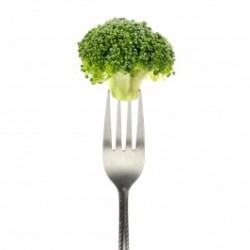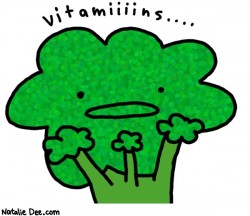
You’ve probably heard the many praises sung on “dark green leafy vegetables.” But are you aware of the awesome benefits of a closely related cruciferous veggie the experts have dubbed a “cancer-fighting superfood?” Broccoli might not be the most trendy vegetable in the produce aisle, but between its many vitamins, minerals and free radical-fighting antioxidants, it is definitely a nutritional powerhouse not to skip over!
Chemical compounds known as glucosinolates are found in vegetables, but particularly cruciferous vegetables such as broccoli, watercress, Brussels sprouts, and cauliflower. One glucosinolate known as glucoraphanin is found in mature broccoli, broccoli sprouts and broccoli seeds, though it is most abundant in broccoli seeds. Glucoraphanin is metabolized into sulforaphane upon reaction with the plant enzyme catalyst myrosinase, which is released upon damage to the plant, such as by cutting during food preparation or by thorough chewing while eating. Sulforaphane now takes the stage as the star of the antioxidant show!

Sulforaphane was first isolated from broccoli in 1992 at Johns Hopkins University School of Medicine. As sulforaphane is heat-sensitive and water-soluble, boiling or microwaving at high temperatures for long periods greatly decreases its bioavailability. Steaming or braising are better options as they use less water, but eating raw broccoli is always the best choice as it retains the highest enzyme count and the most glucosinolate compounds! Sulforaphane has been shown in clinical studies to be effective in many types of cancers, including breast cancer. Sulforaphane not only stops normal cells from becoming cancerous, but there is even more data that suggest it may also prevent existing malignant cells from proliferating! Sulforaphane even boosts the body’s detoxification enzymes and helps maintain healthy levels of essential vitamins A, C, and E.
If broccoli and other cruciferous vegetables aren’t your thing, Peoples has a number of supplement options available. NuMedica’s BrocColinate® Extra Strength provides 60 mg of sulforaphane per capsule. For an even more comprehensive option, NuMedica’s Power Greens® Premium not only has a delicious berry taste, but it even contains BrocColinate® and other vitamins, minerals, herbs, fruits and vegetables! Xymogen also has several products containing sulforaphane including OncoPLEX™, Nrf2 Activator™, and NeuroActives™ BrainSustain. Come by and talk to our friendly and knowledgeable wellness staff at Peoples and find out what may fit your specific needs best!
by Casey Patton, Wellness Specialist.
References:- Johnson IT. Glucosinolates: bioavailability and importance to health. Int J Vitam Nutr Res. 2002 Jan;72(1):26-31.
- Pawlik A, Wicsk A, Kaczyńska A, Antosiewicz J, Herman-Antosiewicz A. Sulforaphane inhibits growth of phenotypically different breast cancer cells. Eur J Nutr. 2013;52:1949-1958.
- Tseng E, Scott-Ramsay EA, Morris ME. Dietary organic isothiocyanates are cytotoxic in human breast cancer CF-7 and mammary epithelial MCF-12A cell lines. Exp Biol Med. 2004;229:835-842.
- West LG, Meyer KA, Balch BA, et al. Glucoraphanin and 4-hydroxyglucobrassicin contents in seeds of 59 cultivars of broccoli, raab, kohlrabi, radish, cauliflower, Brussels sprouts, kale, and cabbage. J Agric Food Chem. 2004 Feb 25;52(4):916-26.
